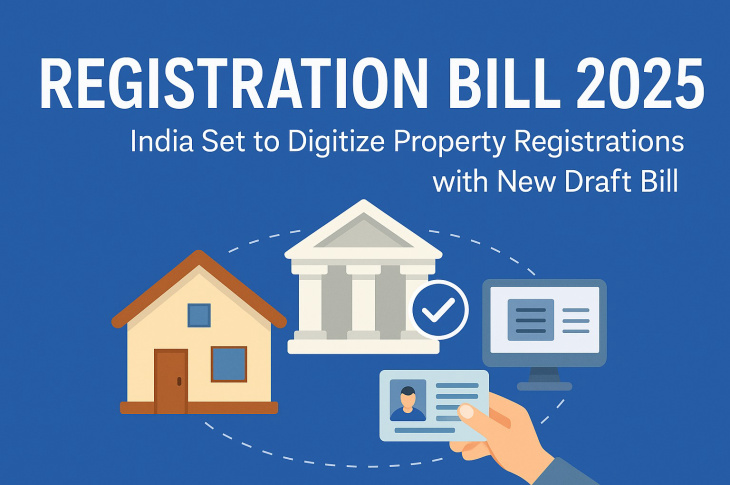Introduction: What is the Registration Bill 2025, and Why Should Homebuyers Care?
In 2025, the Indian real estate sector witnessed a landmark development with the introduction of the Registration Bill 2025. Touted as one of the most progressive legislative reforms in recent years, this bill aims to streamline property registration, protect homebuyers’ interests, and curb fraudulent practices that have long plagued the real estate market.
For decades, property registration in India has been riddled with issues—opaque processes, delayed approvals, and a lack of digital infrastructure. The Registration Bill 2025 addresses these concerns through a series of new rules, technological integrations, and regulatory changes that promise a more transparent, secure, and buyer-friendly property ecosystem.
This blog breaks down the bill in a systematic, easy-to-understand manner while covering all its vital aspects. If you’re a homebuyer, seller, investor, or even a real estate agent, understanding this bill can protect your financial future and help you make informed decisions.
Also Read:- Big Relief for Flat Owners: No Transfer Charges on Gift Deeds to Family Members
What Are the Main Objectives of the Registration Bill 2025?

The bill is designed to achieve multiple goals that address the core pain points of the real estate sector. Some of its key objectives include:
- Enhancing transparency and accountability in the registration process.
- Minimizing property registration fraud.
- Simplifying property transfer and registration procedures.
- Accelerating the digitization of land records.
- Empowering homebuyers with legal recourse and real-time property data access.
- Promoting fair market practices in both primary and secondary markets.
Also Read:- Real Estate Tokenization: Benefits, Risks, and How It Works
What Are the Key Highlights of the New Property Registration Rules in 2025?

The Registration Bill 2025 has introduced several significant provisions, such as:
- Digital-First Registration System
All property registrations must now be carried out through a centralized digital portal integrated with state government systems and land records databases.
- Real-Time Verification of Ownership
The bill mandates instant verification of title and ownership data before allowing registration to proceed.
- Mandatory Aadhaar and PAN Linking
Buyers and sellers must now link their Aadhaar and PAN details to ensure identity verification and curb benami transactions.
- Time-Bound Registration Window
Authorities are legally bound to complete registration and documentation within 7 working days of application submission.
- E-Stamp Duty Integration
Stamp duty payments will now be processed through a single-window digital interface integrated with the e-GRAS or state-specific platforms.
Also Read:- How to Buy E-Stamp in Maharashtra in 2025-26?
How Will the Registration Bill 2025 Benefit Homebuyers?
The bill is particularly advantageous for first-time homebuyers and NRI investors. Here’s how:
- Transparency: Digital records reduce manipulation and fraudulent transactions.
- Efficiency: Time-bound processes eliminate delays.
- Accountability: Legal mechanisms are in place to penalize erring officials.
- Legal Clarity: Uniform documentation formats and clarity on property boundaries.
- Ease of Transaction: Simple, digital-first registration promotes smoother deals, especially in metro cities like Mumbai, Delhi, and Bengaluru.
Is the Registration Bill 2025 Linked to Real Estate Digitization in India?

Yes. The bill complements the broader Digital India Land Records Modernization Programme (DILRMP). It pushes for:
- Unified digital land and property database.
- QR-coded property documents.
- Blockchain-based title verification pilot projects.
- Integration of GIS mapping and drone surveys for land demarcation.
These advancements mean that homebuyers can now verify a property’s legality, past ownerships, and encumbrances in real time.
Also Read:- Pune Airport: Terminal | Lounge | Connectivity & Nearest Hotels
What Are the Penalties for Non-Compliance Under the Bill?

Strict penalties have been proposed to deter malpractice, including:
- Up to ₹5 lakh fine for unauthorized property registration.
- Legal action against officials who delay registrations beyond the stipulated timeline.
- Criminal prosecution in the case of intentional document forgery.
This makes the process not just efficient but also secure and buyer-centric.
How Will the New Rules Impact NRI and Foreign Investors?
The bill makes it easier and safer for NRI homebuyers in India to invest, with:
- OTP-based verification for NRIs using overseas Aadhaar linked to Indian bank accounts.
- Centralized grievance redressal cell for overseas investors.
- Easier POA (Power of Attorney) validation and verification through consulate integration.
What Role Will States Play Under the Registration Bill 2025?
Though it’s a central law, state governments have a pivotal role:
- Maintaining and updating local land records.
- Training registration officials on new digital norms.
- Rolling out awareness campaigns in regional languages.
- Ensuring timely and seamless integration with central portals.
Also Read:- Sambal Card Apply Online: Download | Registration | Check Status
How Will the Bill Impact the Secondary Real Estate Market?
One of the biggest beneficiaries of this reform is the resale property segment. With:
- Real-time title verification,
- Reduced documentation errors, and
- Immediate access to the sale deed history,
The secondary real estate market in India is now safer and more lucrative for buyers.
Can the Registration Bill 2025 Help Reduce Property Disputes?
Yes. With robust verification, digitized records, and integrated dispute redressal:
- Encroachment cases can be quickly resolved.
- Duplicate sale deeds will be auto-flagged by the system.
- All parties can cross-check ownership lineage before buying.
This dramatically reduces legal disputes post-sale and gives homebuyers peace of mind.
What Technology Platforms Are Being Introduced Under the Bill?

The following tech integrations are part of the bill:
- One Nation One Subscription Portal.
- Blockchain-backed transaction logs (in pilot phase).
- AI-powered fraud detection system.
- Virtual walkthroughs and 3D geo-spatial mapping for new project launches.
Will This Affect Property Prices in India?
While prices may not change immediately, buyer confidence is expected to rise, which could:
- Boost transaction volumes.
- Reduce the illegal premium paid for title-clean properties.
- Help developers price their inventory more transparently.
In the long run, streamlined property registration can bring down transaction costs, making homes more affordable.
How Does It Compare with Previous Registration Processes?
| Feature |
Old System |
Registration Bill 2025 |
| Registration Mode |
Offline/Physical |
Fully Digital |
| Timeline |
15-30 days |
7 working days |
| Ownership Verification |
Manual |
Automated/Real-time |
| Fraud Risk |
High |
Extremely Low |
| Accessibility |
Region-specific |
Pan-India |
| Stamp Duty Payment |
Separate platforms |
Integrated |
Are Builders and Developers Also Affected?
Yes, developers must:
- Ensure proper RERA registration before promoting a project.
- Submit digitized land ownership proof.
- Make project details available on the registration portal.
This puts added responsibility on builders but ensures better transparency for homebuyers and real estate investors.
What Is the Public Reaction So Far?

Initial response from citizens, legal experts, and real estate professionals has been overwhelmingly positive. The common feedback includes:
- “Much needed clarity and modernization.”
- “Great for first-time homebuyers.”
- “Will definitely reduce black money transactions.”
What Does It Mean for the Future of Real Estate in India?
The Registration Bill 2025 is not just a policy update—it is a real estate revolution. It aligns with India’s broader vision of digital governance and financial transparency, setting the stage for:
- Smart cities with mapped land ownership.
- Fully digitized buying and selling journeys.
- A major boost in NRI real estate investments in India.
Conclusion: Embrace Transparency, Security, and Simplicity with the Registration Bill 2025
The Registration Bill 2025 is a definitive step toward empowering Indian homebuyers. By eliminating loopholes, simplifying the process, and incorporating cutting-edge technology, the bill creates a win-win scenario for everyone involved.
For buyers, it reduces uncertainty. For the government, it boosts trust. And for developers, it ensures compliance and smoother project approvals.
At Housiey News, we’re dedicated to helping you navigate this new era of real estate with ease. We connect homebuyers directly with builders, eliminating the need for multiple brokers. This makes the buying process smoother, more transparent, and truly hassle-free.
If you’re interested in how technology will further transform Indian real estate, don’t miss our blog on Real Estate Tokenization—a game-changer in property investments.
FAQs
Introduction: What is the Registration Bill 2025, and Why Should Homebuyers Care?
In 2025, the Indian real estate sector witnessed a landmark development with the introduction of the Registration Bill 2025. Touted as one of the most progressive legislative reforms in recent years, this bill aims to streamline property registration, protect homebuyers’ interests, and curb fraudulent practices that have long plagued the real estate market.
For decades, property registration in India has been riddled with issues—opaque processes, delayed approvals, and a lack of digital infrastructure. The Registration Bill 2025 addresses these concerns through a series of new rules, technological integrations, and regulatory changes that promise a more transparent, secure, and buyer-friendly property ecosystem.
This blog breaks down the bill in a systematic, easy-to-understand manner while covering all its vital aspects. If you’re a homebuyer, seller, investor, or even a real estate agent, understanding this bill can protect your financial future and help you make informed decisions.
Also Read:- Big Relief for Flat Owners: No Transfer Charges on Gift Deeds to Family Members
What Are the Main Objectives of the Registration Bill 2025?

The bill is designed to achieve multiple goals that address the core pain points of the real estate sector. Some of its key objectives include:
- Enhancing transparency and accountability in the registration process.
- Minimizing property registration fraud.
- Simplifying property transfer and registration procedures.
- Accelerating the digitization of land records.
- Empowering homebuyers with legal recourse and real-time property data access.
- Promoting fair market practices in both primary and secondary markets.
Also Read:- Real Estate Tokenization: Benefits, Risks, and How It Works
What Are the Key Highlights of the New Property Registration Rules in 2025?

The Registration Bill 2025 has introduced several significant provisions, such as:
- Digital-First Registration System
All property registrations must now be carried out through a centralized digital portal integrated with state government systems and land records databases.
- Real-Time Verification of Ownership
The bill mandates instant verification of title and ownership data before allowing registration to proceed.
- Mandatory Aadhaar and PAN Linking
Buyers and sellers must now link their Aadhaar and PAN details to ensure identity verification and curb benami transactions.
- Time-Bound Registration Window
Authorities are legally bound to complete registration and documentation within 7 working days of application submission.
- E-Stamp Duty Integration
Stamp duty payments will now be processed through a single-window digital interface integrated with the e-GRAS or state-specific platforms.
Also Read:- How to Buy E-Stamp in Maharashtra in 2025-26?
How Will the Registration Bill 2025 Benefit Homebuyers?
The bill is particularly advantageous for first-time homebuyers and NRI investors. Here’s how:
- Transparency: Digital records reduce manipulation and fraudulent transactions.
- Efficiency: Time-bound processes eliminate delays.
- Accountability: Legal mechanisms are in place to penalize erring officials.
- Legal Clarity: Uniform documentation formats and clarity on property boundaries.
- Ease of Transaction: Simple, digital-first registration promotes smoother deals, especially in metro cities like Mumbai, Delhi, and Bengaluru.
Is the Registration Bill 2025 Linked to Real Estate Digitization in India?

Yes. The bill complements the broader Digital India Land Records Modernization Programme (DILRMP). It pushes for:
- Unified digital land and property database.
- QR-coded property documents.
- Blockchain-based title verification pilot projects.
- Integration of GIS mapping and drone surveys for land demarcation.
These advancements mean that homebuyers can now verify a property’s legality, past ownerships, and encumbrances in real time.
Also Read:- Pune Airport: Terminal | Lounge | Connectivity & Nearest Hotels
What Are the Penalties for Non-Compliance Under the Bill?

Strict penalties have been proposed to deter malpractice, including:
- Up to ₹5 lakh fine for unauthorized property registration.
- Legal action against officials who delay registrations beyond the stipulated timeline.
- Criminal prosecution in the case of intentional document forgery.
This makes the process not just efficient but also secure and buyer-centric.
How Will the New Rules Impact NRI and Foreign Investors?
The bill makes it easier and safer for NRI homebuyers in India to invest, with:
- OTP-based verification for NRIs using overseas Aadhaar linked to Indian bank accounts.
- Centralized grievance redressal cell for overseas investors.
- Easier POA (Power of Attorney) validation and verification through consulate integration.
What Role Will States Play Under the Registration Bill 2025?
Though it’s a central law, state governments have a pivotal role:
- Maintaining and updating local land records.
- Training registration officials on new digital norms.
- Rolling out awareness campaigns in regional languages.
- Ensuring timely and seamless integration with central portals.
Also Read:- Sambal Card Apply Online: Download | Registration | Check Status
How Will the Bill Impact the Secondary Real Estate Market?
One of the biggest beneficiaries of this reform is the resale property segment. With:
- Real-time title verification,
- Reduced documentation errors, and
- Immediate access to the sale deed history,
The secondary real estate market in India is now safer and more lucrative for buyers.
Can the Registration Bill 2025 Help Reduce Property Disputes?
Yes. With robust verification, digitized records, and integrated dispute redressal:
- Encroachment cases can be quickly resolved.
- Duplicate sale deeds will be auto-flagged by the system.
- All parties can cross-check ownership lineage before buying.
This dramatically reduces legal disputes post-sale and gives homebuyers peace of mind.
What Technology Platforms Are Being Introduced Under the Bill?

The following tech integrations are part of the bill:
- One Nation One Subscription Portal.
- Blockchain-backed transaction logs (in pilot phase).
- AI-powered fraud detection system.
- Virtual walkthroughs and 3D geo-spatial mapping for new project launches.
Will This Affect Property Prices in India?
While prices may not change immediately, buyer confidence is expected to rise, which could:
- Boost transaction volumes.
- Reduce the illegal premium paid for title-clean properties.
- Help developers price their inventory more transparently.
In the long run, streamlined property registration can bring down transaction costs, making homes more affordable.
How Does It Compare with Previous Registration Processes?
| Feature |
Old System |
Registration Bill 2025 |
| Registration Mode |
Offline/Physical |
Fully Digital |
| Timeline |
15-30 days |
7 working days |
| Ownership Verification |
Manual |
Automated/Real-time |
| Fraud Risk |
High |
Extremely Low |
| Accessibility |
Region-specific |
Pan-India |
| Stamp Duty Payment |
Separate platforms |
Integrated |
Are Builders and Developers Also Affected?
Yes, developers must:
- Ensure proper RERA registration before promoting a project.
- Submit digitized land ownership proof.
- Make project details available on the registration portal.
This puts added responsibility on builders but ensures better transparency for homebuyers and real estate investors.
What Is the Public Reaction So Far?

Initial response from citizens, legal experts, and real estate professionals has been overwhelmingly positive. The common feedback includes:
- “Much needed clarity and modernization.”
- “Great for first-time homebuyers.”
- “Will definitely reduce black money transactions.”
What Does It Mean for the Future of Real Estate in India?
The Registration Bill 2025 is not just a policy update—it is a real estate revolution. It aligns with India’s broader vision of digital governance and financial transparency, setting the stage for:
- Smart cities with mapped land ownership.
- Fully digitized buying and selling journeys.
- A major boost in NRI real estate investments in India.
Conclusion: Embrace Transparency, Security, and Simplicity with the Registration Bill 2025
The Registration Bill 2025 is a definitive step toward empowering Indian homebuyers. By eliminating loopholes, simplifying the process, and incorporating cutting-edge technology, the bill creates a win-win scenario for everyone involved.
For buyers, it reduces uncertainty. For the government, it boosts trust. And for developers, it ensures compliance and smoother project approvals.
At Housiey News, we’re dedicated to helping you navigate this new era of real estate with ease. We connect homebuyers directly with builders, eliminating the need for multiple brokers. This makes the buying process smoother, more transparent, and truly hassle-free.
If you’re interested in how technology will further transform Indian real estate, don’t miss our blog on Real Estate Tokenization—a game-changer in property investments.
FAQs












